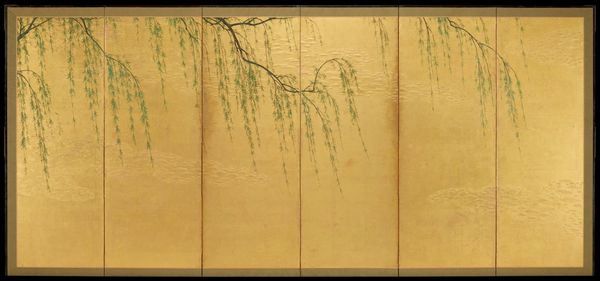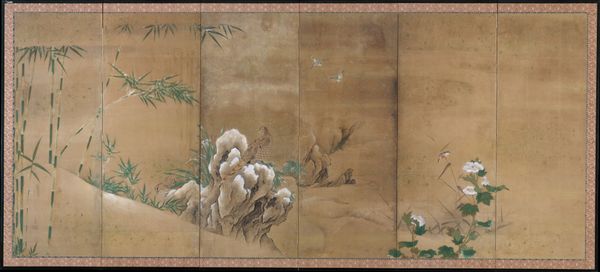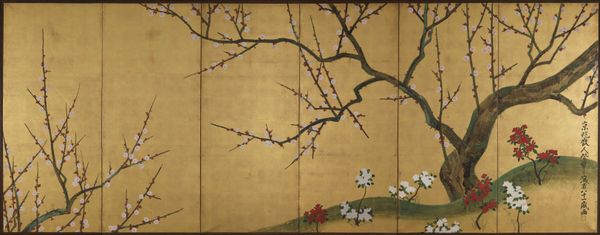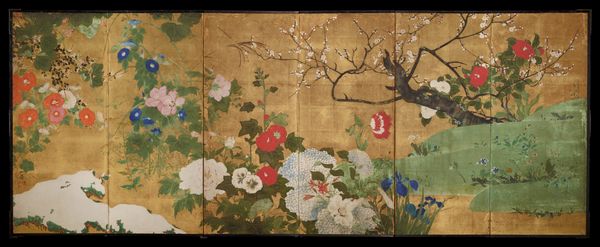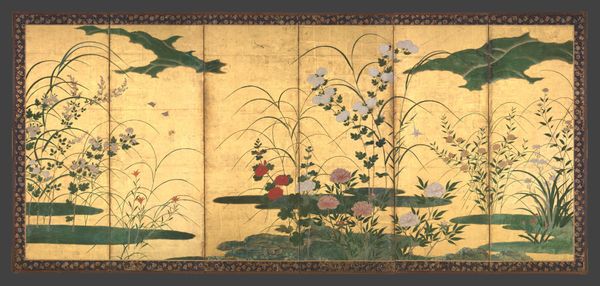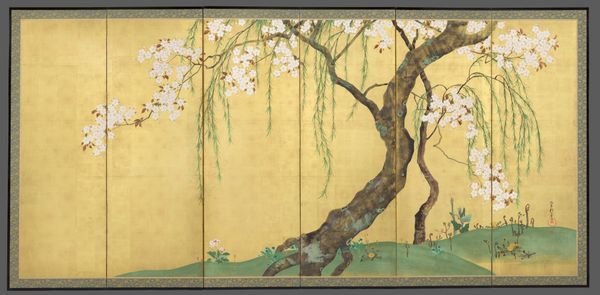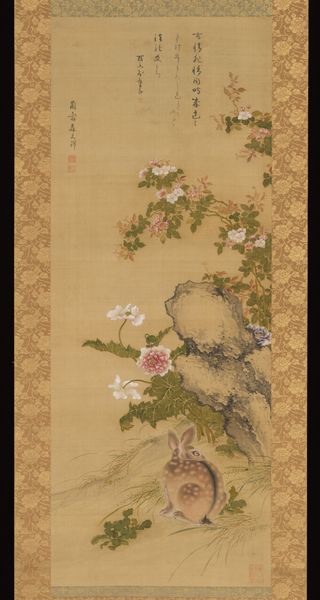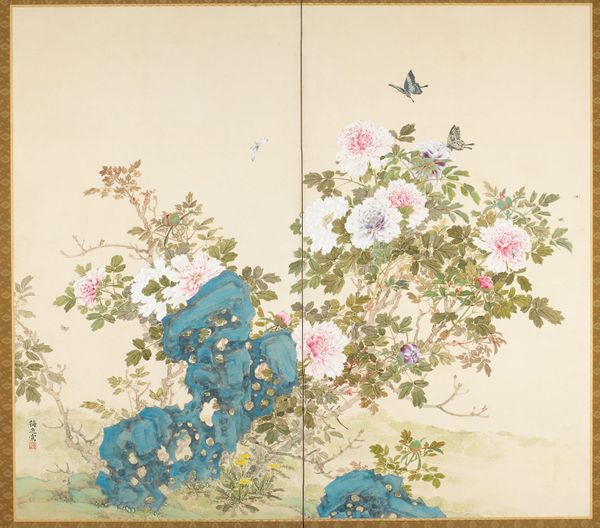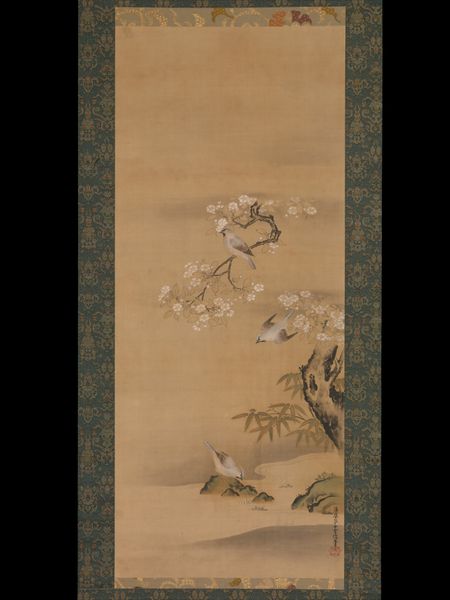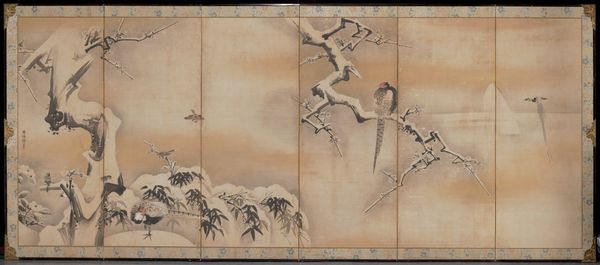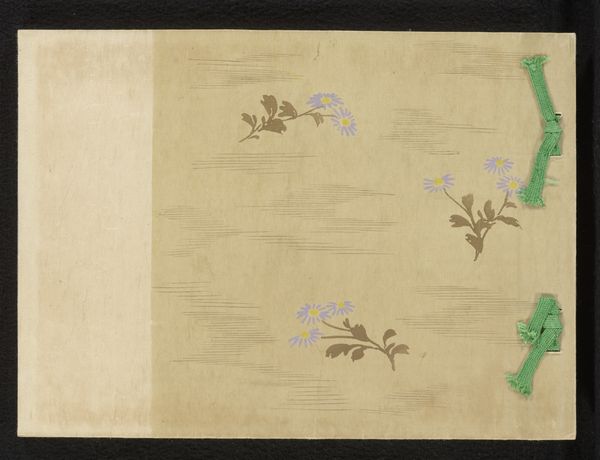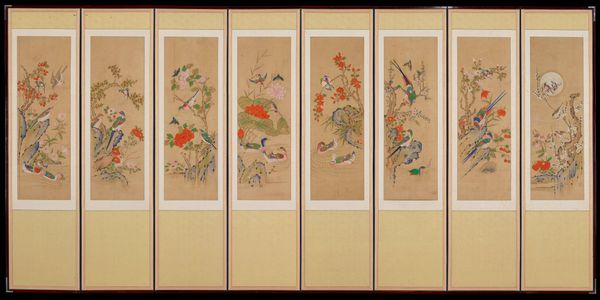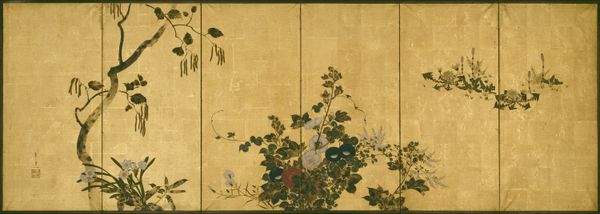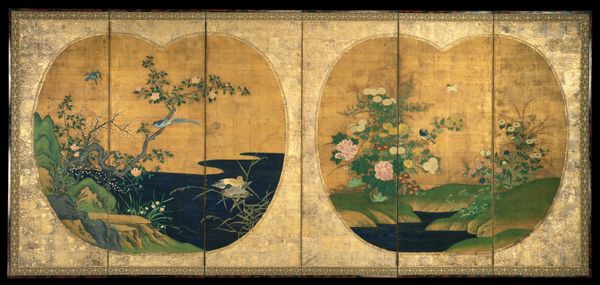![Cherry [right of a pair of Cherry and Willow] by Hasegawa School](/_next/image?url=https%3A%2F%2Fd2w8kbdekdi1gv.cloudfront.net%2FeyJidWNrZXQiOiAiYXJ0ZXJhLWltYWdlcy1idWNrZXQiLCAia2V5IjogImFydHdvcmtzL2E3NjE3MTM1LTA3YjItNGU3NS1hZWZlLTcwN2NhOWFjOWZiYi9hNzYxNzEzNS0wN2IyLTRlNzUtYWVmZS03MDdjYTlhYzlmYmJfZnVsbC5qcGciLCAiZWRpdHMiOiB7InJlc2l6ZSI6IHsid2lkdGgiOiAxOTIwLCAiaGVpZ2h0IjogMTkyMCwgImZpdCI6ICJpbnNpZGUifX19&w=3840&q=75)
Cherry [right of a pair of Cherry and Willow] c. 17th century
0:00
0:00
tempera, painting
#
organic
#
tempera
#
painting
#
landscape
#
ukiyo-e
#
japan
#
form
#
organic pattern
#
orientalism
#
line
#
watercolor
#
yamato-e
#
calligraphy
Dimensions: 64 × 141 3/4 in. (162.56 × 360.05 cm) (image)70 1/4 × 148 1/4 × 5/8 in. (178.44 × 376.56 × 1.59 cm) (outer frame)
Copyright: Public Domain
Curator: This screen, "Cherry," likely from the 17th century and attributed to the Hasegawa School, immediately evokes springtime. Editor: It’s almost overwhelmingly golden. The texture alone, the subtle shimmering variations against the restrained blossoms, feels intensely rich. Curator: This work would originally have been one half of a pair with the title "Cherry and Willow.” Such folding screens were frequently commissioned, integrating elements of nature, particularly plants, into everyday domestic spaces and ceremonial settings. Consider the complex tempera preparation— pigments, binders, supports. The labour itself signifies value. Editor: Value, absolutely, is palpable. Note how the painterly gesture maintains exquisite clarity despite the density of the composition, from the angular branches to the delicate stamens. Look closely, it verges on abstraction! Curator: It is also significant to recognize this imagery within a broader economic landscape. These screens would function as commodities representing wealth and status within the structures of society at the time. Also, this suggests the important role the Hasegawa school played for many decades in satisfying elite customers' needs. Editor: I understand. Yet I am drawn back to its visual equilibrium: that single cascade of smaller foliage on the right anchors the whole composition perfectly. Without that, the weight of the upper branches would overwhelm the work. It reveals, essentially, how carefully and cleverly the structure supports meaning. Curator: So, viewing this not just for beauty, but considering who made it, for whom, and from what materials offers essential insights. Editor: Yes, I’m happy to admit that recognizing that deeper system only intensifies the pleasure that is to be had by looking. The simple balance within this dazzling screen continues to unfold for us today.
Comments
minneapolisinstituteofart about 2 years ago
⋮
The overhanging limbs of a willow with recently sprouted leaves, branches of a cherry tree in full bloom, and the top of a clump of flowering grasses are the only painted motifs in this pair of folding screens. There is much more to be uncovered, however, when we look closely. An invisible breeze moves in from the left, causing the willow branches to reach slightly to the right. The grasses and cherry branches in the right screen, too, are in movement, seemingly lifted up by a wind from below. The missing tree trunks and the hidden base of the clump of grass suggest that we, the viewers, see all of this from some high point, looking down through the branches toward the expanse of gold foil, interrupted only by ambiguous gold forms—created by building up shell-white pigment (gofun) on the paper surface and then covering it in gold—that also appear to move across the surface, as if driven by the wind. Are they clouds' Mist' Or do they represent the shimmering, rippling surface of some body of water far below'
Join the conversation
Join millions of artists and users on Artera today and experience the ultimate creative platform.
